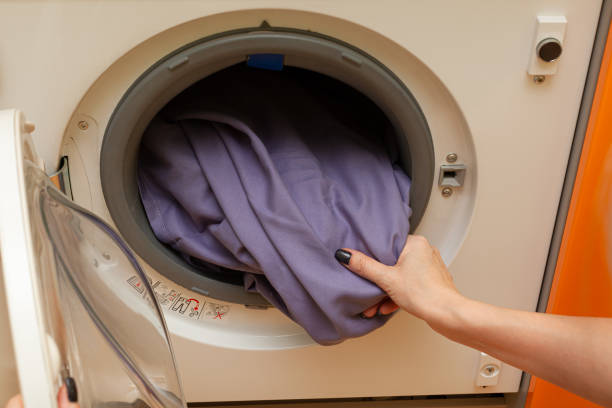After a long day, there is nothing worse than crawling into bed and smelling, seeing, or touching a dirty comforter. After all, a comforter with a pleasant scent can make you more comfortable and fall asleep more quickly. Although comforters should be washed every few months, other factors also affect how frequently you should wash your comforter.
See more information about how frequently to wash a comforter below.
Table of Contents
How Often to Wash Your Comforter?
The majority of comforters need to be washed every month or every two months. If your comforter is covered by a duvet, you can decide whether to wash the duvet more frequently than the comforter. Even if it is covered, you should still try to wash your comforter a few times a year. In order to ensure that you are sleeping with clean linens, duvets should be washed every two months.
You already know that you perspire while you sleep, which suggests that your perspiration may be soaking into your comforter. Not only that, but when you finally get to bed for the night, allergies like dust mites in comforters can make you feel sick. Numerous issues can arise from dirty comforters. Even though you might not wash your comforter as frequently as you wash your t-shirt, think about how often you wear clothing that touches your body. Even though your comforter is protected from contact with your skin by pajamas, it still manages to gather dirt and grime.
Maintaining a clean comforter can help you sleep better because you won’t have to worry about dust mites, allergens, or a strange odor.
What Factors Determine How Often to Wash a Comforter?
We’ve outlined a few variables that can affect your washing cycle so you can decide how frequently to wash your comforter. Take a look at how often to wash a comforter below:
Bedding Material
To avoid accidentally destroying the comforter, delicate bedding should be dry cleaned rather than washed. For instance, when it comes to down vs. down alternative comforters, you can typically wash a down alternative comforter in a washing machine but should dry clean your down comforter. What makes a down comforter different from down alternatives in that you can’t machine wash it? Because down comforters contain feathers, they are delicate and can become damaged if not washed properly. Additionally, dry cleaning can guarantee proper washing of the bedding.
Duvet Cover
As was previously mentioned, you should wash your duvet cover more frequently than your comforter if you use one.
Hygiene Habits
You can get away with washing your comforter less frequently if you take a shower before bed because you won’t likely be adding a lot of dirt and grime to it every night. You might need to wash your bedding more frequently, though, if you perspire at night. Consider purchasing the best down comforter for hot sleepers if your inability to fall asleep is being hampered by your tendency to get hot at night.
Illness
Consider washing your comforter more frequently if you’re sick to help prevent the spread of germs. When you feel better, wash your sheets as well to prevent reintroducing germs into your body.

Sharing
It’s possible that you’ll need to wash your comforter more frequently if you share it with a partner. Keep in mind that more people equal more sweat, dirt, and grime. Similarly to this, if your pet and you share a bed, you should frequently wash your comforter, especially if your pet is a dog. Keep in mind that while out for walks, your dog’s paws were covered in mud, so you never know what they might bring into bed with them.
Spills
It’s common to eat and drink in bed, but the more you eat there, the more likely it is that you’ll have crumbs that will attract bugs. In order to avoid a stain from developing, you should wash your comforter right away after a spill.
Preference
Some people decide to wash their comforters once a week because they find that the clean scent of their laundry detergent makes it easier for them to fall asleep. If your wash schedule doesn’t have an effect on your health or the quality of your sleep, you may choose how frequently you wash your sheets.
How to Wash a Comforter?
Check the Tag
The care instructions are on the tag attached to your comforter. To ensure that you don’t lose any quality, the tag will specify the machine and dryer settings to use. Unfortunately, it may also advise that your comforter should only be dry cleaned, in which case you might need to take it to a dry cleaner on occasion for a deep clean and to make sure that your comforter doesn’t get damaged.
Use the Right Settings
Use a washer and dryer that are big enough to fit your comforter every time. Some blankets might not fit in typical machines. You might need to take the comforter to a laundromat or dry cleaner rather than trying to jam it as far down the machine as you can. If you jam your comforter into the washer without giving it enough room, the detergent may not be able to reach all of its surfaces, which means that you won’t be cleaning the entire comforter.
Consider Sanitizing
Some comforters shouldn’t be washed in hot water. However, if your comforter can be cleaned by washing it in warm or hot water, think about doing so at least once a month to keep it clean. If the tag on your comforter doesn’t mention warm or hot water, it’s usually best to avoid the risk. Rather, adhere strictly to the guidance provided.
Consider Air Drying Or Low Heat
To avoid the inner components of the comforter clumping together, dry it in the air or on low heat.
Take It to a Dry Cleaner
Consider taking your comforter to a dry cleaner to make sure it is clean and sanitized. Your comforter can be cleaned properly by dry cleaners so that it is thoroughly cleaned and dried without being ruined. You don’t have to go to the dry cleaners if you don’t want to because many comforters, like the Layla Down Comforter, are machine-washable.
Start Drying Immediately
Some of us have a tendency to start the washing machine and then completely forget about it until the next day. Unfortunately, this means that your comforter has been damp in a dark, enclosed space for hours, which means that it has turned into a haven for mildew and bacteria. This applies to every item you wash in your machine, including comforters. When your comforter is finished in the washer, immediately transfer it to the dryer to finish drying it as thoroughly as possible.

How Often to Wash Other Types of Bedding?
Sheets
Because they come into direct contact with the skin and gather bacteria, allergens, body oils, dirt, and dead skin cells, bed sheets should be washed once a week. You may even want to wash your sheets more frequently if you have pets or kids who share your bed.
Pillowcases
Pillowcases should be washed once a week or more because they come into contact with your face and neck skin, which can occasionally be dirtier than the rest of your body. Consider washing your pillowcase more frequently if you frequently experience skin issues like acne.
Duvets
The need for frequent washing of your sheets and pillowcases is reduced by the use of duvets, which will keep your comforter clean. To remove dirt and dust mites, you should nevertheless wash your duvet every few weeks.
Blankets
If you don’t use your blankets every night or every few months, you can wash them more frequently. Consider folding and storing your blankets in a closet if you aren’t using them every night to keep them tidy for the next time you need them.
Should You Wash a Comforter before Using It for the First Time?
It’s tempting to want to make your bed as soon as you get a new comforter or bedding. Nevertheless, even if they are all wrapped in airtight packaging, you should always wash new bedding and comforters before using them. All of these items—sheets, comforters, duvets, and pillowcases—are made in factories that are polluted with dust, chemicals, dyes, and other skin irritants. Therefore, a comforter should be washed before being used.
Have you ever noticed that fresh sheets or other textiles are stiff right out of the packaging? Even if you do not have allergies, that chemical residue from the manufacturing process can itch and irritate you. Additionally, freshly cleaned and laundered bedding has a softer feel and is more comfortable to use.
Close Note
A comforter should be washed at least once every few weeks, and more frequently if you have a pet or perspire while you sleep. You can usually get away with washing your comforter less frequently if you take a bath before going to bed and don’t share your bed with anyone else. However, dust and other allergens can still accumulate, so there’s no reason not to wash your comforter or purchase a duvet cover to make sure that you’re taking good care of your comforter so that you can sleep better.
